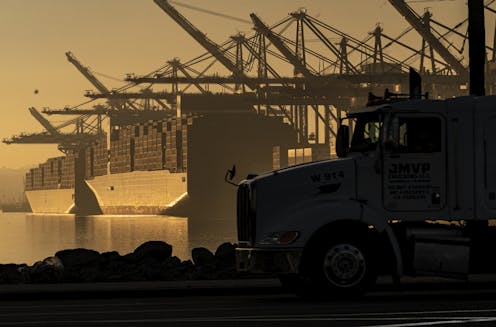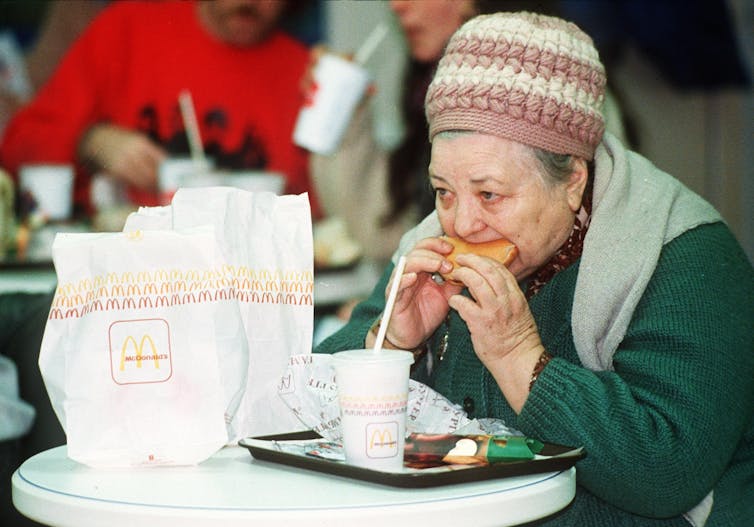
Francis Fukuyama, the American political scientist who once described the collapse of the Soviet Union as the “end of history,” suggested that Russia’s invasion of Ukraine might be called “the end of the end of history.” He meant that Vladimir Putin’s aggression signals a rollback of the ideals of a free Europe that emerged after 1991. Some observers suggest it may kick off a new Cold War, with an Iron Curtain separating the West from Russia.
As an expert in global supply chains, I think the war portends the end of something else: global supply chains that Western companies built after the Berlin Wall fell over three decades ago.
Supply chains – often vast networks of resources, money, information and people that companies rely on to get goods or services to consumers – were already in disarray because of the COVID-19 pandemic, resulting in massive shortages, disruptions and price inflation. The war and resulting sanctions against Russia have immediately put further strains on them, prompting skyrocketing energy prices and even fears of famine.
But beyond these short-term effects, I believe the war in Ukraine could drastically reshape global supply chains in a way the pandemic never did.

Immediate effects: Fuel and famine
Russia accounts for less than 2% of global gross domestic product, while Ukraine accounts for only 0.14%. As a result, they have little direct impact on global supply chains – except in a few very important areas.
Let’s start with the most obvious one: energy. Russia supplies nearly 40% of Europe’s natural gas supply and 65% of Germany’s. It is the third-largest oil exporter in the world, accounting for 7% of all crude oil and petroleum product imports into the United States. After the Biden administration signaled it would stop importing Russian oil, the price of crude topped US$130 per barrel for the first time in 13 years, and consumers in some parts of the U.S. have seen average gasoline prices rise above $5 per gallon.
Less obviously, Russia and Ukraine account for nearly one-third of all global wheat exports. Several countries, including Kazakhstan and Tanzania, import more than 90% of their wheat from Russia. The war has the potential to disrupt the still-recovering global food supply chain and endanger the livelihoods of millions of people.
Even less obviously, Ukraine produces 90% of the semiconductor-grade neon used in the United States. Russia, on the other hand, provides the United States more than a third of its palladium, a rare metal also required to make semiconductors. Although companies have enough inventory to fulfill immediate needs and may find alternative suppliers, some disruptions are inevitable. And this comes at a time when the world is still suffering from a severe chip shortage, which has slowed auto production and sent new and used car prices soaring.
It is also worth noting that Russia is a dominant exporter of titanium and titanium forgings, which are popular in the aerospace industry because of their light weight. This war will further stress the aerospace supply chain.
Snarling trade
While the direct effects of the war on supply chains are relatively limited, the impact on the global movement of goods and services has been significant – I believe even greater than from COVID-19.
After 36 countries, including EU members, the U.S. and Canada, closed their airspace to Russian aircraft, Russia retaliated with the same restrictions. As a result, goods transported by air freight from China to Europe or the Eastern U.S. may need to be rerouted or use slower or more expensive modes of transportation. The China-Europe rail freight route that goes through Russia, which was experiencing a boom in 2021 because of congestion in major ports, now faces mounting cancellations from European clients.
The war has also had a devastating impact on global trade movements, with hundreds of tankers and bulk carriers stranded at ports as a result of sanctions imposed on Russian-connected ships. It has also resulted in severe travel and transport restrictions imposed on Russia and Belarus in an unprecedentedly rapid and broad manner that has been coordinated among multiple nations.
In addition, the disruption of the route from China to Europe and the U.S. could do severe damage to China’s “Belts and Roads” initiative. That’s the ambitious trillion-dollar project aimed at reshaping global trade and affirming the dominance of a China-centric global supply chain, especially in Europe and Asia. Because both Russia and Ukraine are critical links in the initiative, it will almost certainly need to scale back in size and scope.

A supply chain Iron Curtain
The New York Times columnist Thomas Friedman, a true believer in globalization, in 1996 famously theorized that no two countries that both have a McDonald’s would ever fight a war against each other. McDonald’s has about 850 restaurants in Russia and 100 in Ukraine, all of which have now been temporarily closed.
His point was that countries with economies and middle classes big enough to support a McDonald’s “don’t like to fight wars; they like to wait in line for burgers.” It was also based on the belief that rational economic calculations will always triumph over geopolitical conflicts – that is, leaders in such countries wouldn’t let their differences get in the way of trade and making money.
And the supply chains that companies erected in the decades since then have crisscrossed the globe, ignoring old enemy lines for the sake of efficiency and higher profits.
Friedman now concedes Russia’s action has shattered that theory. I agree, and in fact the world may now be on the cusp of a new type of supply chain Iron Curtain with Russia and its allies on one side and the West on the other. Companies will no longer be able to separate business from geopolitics.
And those allies include China, which remains pivotal to most Western companies’ supply chains. Despite China’s ambiguous stance on the invasion, the war will likely serve as a catalyst to reduce that dependence, at least for critical products such as materials used for semiconductor manufacturing, medical supplies and electric batteries.
Moreover, the growing emphasis of shareholders and regulators on environmental, social and governance issues means how a company does in each category can affect its daily operations and cost of capital. On the issue of Ukraine, the push to be more socially responsible is one reason companies have overcomplied with sanctions. It’s also prompting them to proactively avoid geopolitical risks, which can involve retreating from an entire economy.
Russia’s war against Ukraine is still ongoing, and there’s no way to know for certain how long the sanctions will remain in place or whether companies that have chosen to leave Russia will return. But I believe one thing is certain: Global supply chains, like the rest of the world, will never be the same again as a result of this war.
[More than 150,000 readers get one of The Conversation’s informative newsletters. Join the list today.]
Tinglong Dai does not work for, consult, own shares in or receive funding from any company or organization that would benefit from this article, and has disclosed no relevant affiliations beyond their academic appointment.
This article was originally published on The Conversation. Read the original article.







